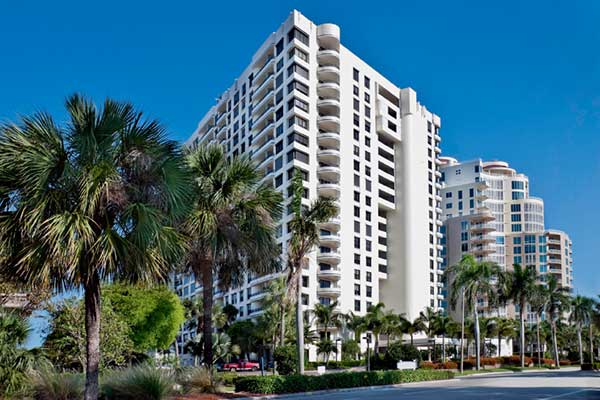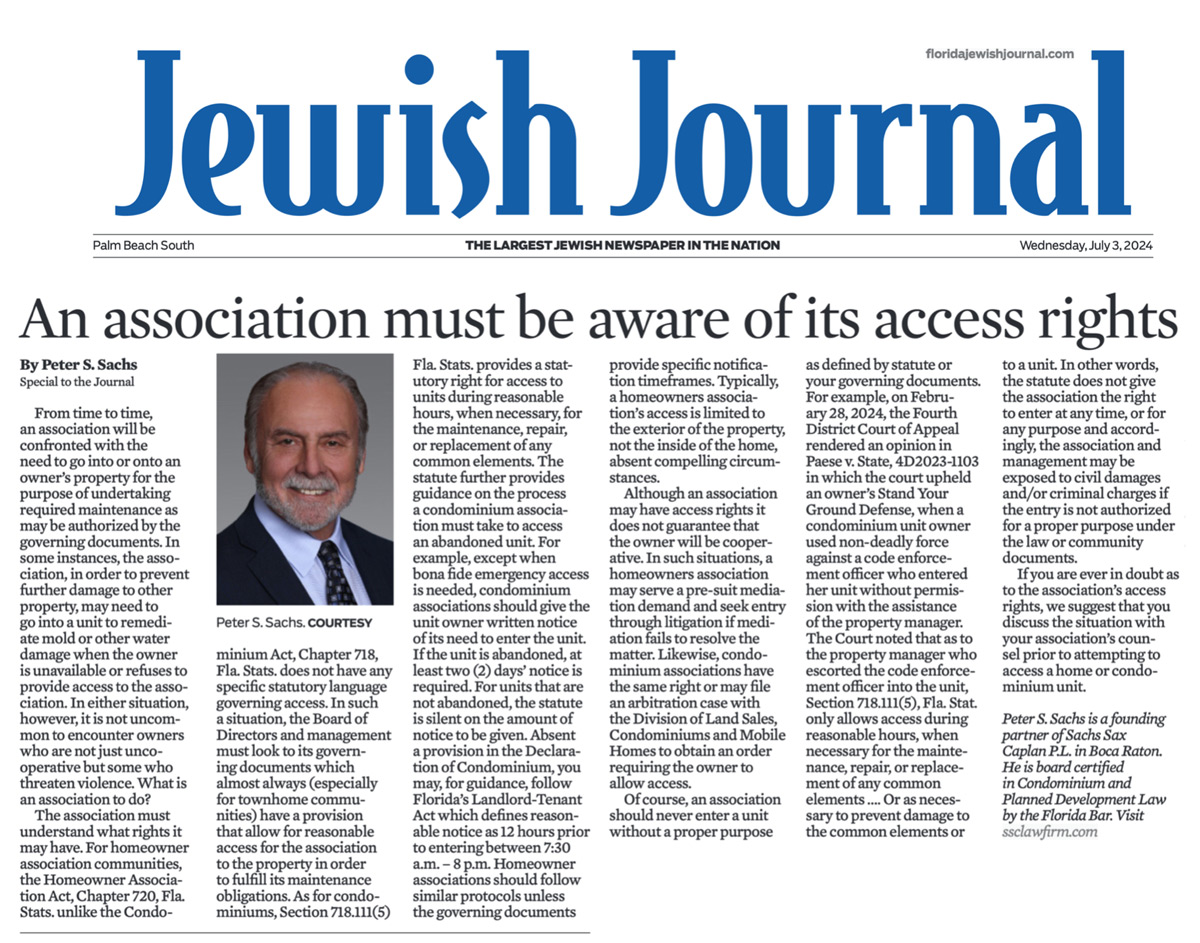Community Association Law - Condominiums
• Representing Condo Associations and Property Management Companies
• Developers, financial institutions & individuals
• Governing documents, collections, statutory and regulatory compliance
• Condo Association Attorneys dedicated to the development of community association law
Sachs Sax Caplan's Condominium Association Attorneys in the Community Association practice group have extensive experience in condominium and community association law and, as pioneers, have long been credited with bringing about landmark changes in this area of the law.
Our Clients
Representing condominium associations, financial institutions and individuals with respect to the vast array of difficult issues faced in the creation of and governance of these organizations, members of this practice group specialize in the preparation of, amendment, revision, elections, turnover, and enforcement of governing documents, collections, statutory and regulatory compliance, board meeting conduct and procedure, as well as the many varied aspects of interpersonal relations and corporate conflicts that develop in residential communities. These attorneys have led the way in creating and structuring mandatory country club membership provisions for owners in established communities with amenity packages.
Condo Association Attorneys in Boca Raton & Serving Community Associations Statewide
Our Condominium and Community Association attorneys have the ability to respond quickly and economically to the numerous ongoing issues that arise during the operation of community associations, including turnover of control from the developer to owners, construction defects, accounting irregularities, misrepresentations, termination of developer imposed contracts, recreation lease litigation and buyouts, recreational districts, condemnation, governmental relations, covenant enforcement and reserve irregularities, with creative solutions backed by solid experience.
Depth of Experience & Groundbreaking Decisions
Interacting with the Commercial Litigation & Appeals Group, this experience includes representation of clients in groundbreaking cases such as Ainslie v. Levy, et. al., where members of this practice group successfully argued that documents unit owners were forced to sign as a condition to closing could not supersede the rights granted to the condominium owners under Florida law. The Firm is also credited with establishing the right of unit owners to cancel a perpetual management reservation of control by the developer over recreational facilities at Century Village, Boca Raton. Preserving a historical tradition of expertise in this area of the law, attorneys in the Community Associations practice group continue to make enormous contributions to the development of community association law in Florida.
Florida Statutes Chapter 718 & Administrative Code Chapters 61B-75 through 79
Florida Condo Law relates to the operation, development, and resolution of issues for Condominiums and their owners. Condominiums are creatures of statute. In Florida, Chapter 718 of the Florida Statutes as well as the Florida Administrative Code Chapters 61B-75 through 79 provide the framework for all Florida Condominiums. Membership in a condominium association is mandatory for all owners within a condominium.
Florida Statutes Section 718.103 defines a condominium association as “any entity responsible for the operation of common elements owned in undivided shares by unit owners, any entity which operates or maintains other real property in which unit owners have use rights, where membership in the entity is composed exclusively of unit owners or their elected or appointed representatives and is a required condition of unit ownership.”
The laws that oversee condominium associations are constantly developing and changing with the times, with amendments being made to the relevant laws every year. Our condo association attorneys can provide you, your association, or management company with a yearly legal update where CEU credit is available.
Unresolved disputes or financial problems can directly impact the enjoyment everyone reaps from property ownership, it is important to work with competent counsel who thoroughly understands Florida law surrounding condo associations and is committed to a prompt response that finds an effective solution.
At Sachs Sax Caplan, our lawyers provide skilled representation for both associations and unit owners.
Below is a sample of matters where Sachs Sax Caplan has provided successful representation for its clients:
- Governing Document Amendment, Revisions and Interpretation
- Declaration, Covenant and Rule Enforcement
- Selective Rule Enforcement
- Late Fees and Regular Assessments
- Special Assessments
- Collection of Delinquent Assessments
- Lien preparation
- Lien Foreclosures
- General Civil Litigation, Arbitration and Mediation
- Insurance Coverage Issues
- Condominium Foreclosure
- Preparation and Review of Purchase Contracts
- Construction Contracts
- Construction Liens
- Developer/Turnover Issues
- Election Abuse/Annual Meeting Assistance
- Purchase and Sale of Condo Units
- Terminating Contracts
- Disputes with the Association/Other Residents
- Damage Caused by Residents and/or Guests
- Theft
- Damage to Vehicles
- Parking Issues
- Pet Issues
- Noise Issues
- Discrimination
Current Events


Homeowners’ and condominium associations play a crucial role in maintaining the harmony and value of residential communities. A common question that arises is whether these associations can adopt amendments that change the leasing rights of owners within the community. Let’s delve into the specifics according to Florida law. Homeowners’ Associations and Leasing Amendments Chapter 720 of the Florida Statutes is called the Florida Homeowners’ Association Act. This law was amended in 2021 to address amendments that regulate the leasing of “parcels” within a homeowners’ association. Typically, the parcel is the home and the land the home sits on, and usually other improved or unimproved portions of lots. A new Section 720.306(1)(h) was added, which says that any amendment to the homeowners’ association’s governing documents, adopted after July 1, 2021, that prohibits or regulates rental agreements, only applies to a parcel owner that acquires title to their parcel after the effective date of the amendment, or to a parcel owner who consents to the amendment. However, this restriction does not apply to amendments which regulate or prohibit rental agreements for terms of 6 months or less. Further, amendments that prohibit the rental of parcels for more than 3 times in a calendar year also apply to all parcel owners. Homeowners’ associations continue to have the ability to adopt amendments that regulate or prohibit leases of 6 months or less, and still have the ability to adopt amendments which prohibit leasing more than 3 times in a calendar year. Condominium Associations and Leasing Amendments For condominiums, Section 718.110(13) of the Florida Condominium Act states that any amendment which prohibits a unit owner from leasing their unit, alters the duration of the rental term, or limits the number of times an owner may rent their unit during a specified period, only applies to those owners who take title after the effective date of the amendment, or those owners who consent to the amendment. There is no 6-month/3 times per year exception in the Condominium Act. Florida Senate Bill 280 During the 2024 Florida legislative session, CS/SB 280 was passed by the Florida Legislature. This...

Last year, there was a disturbing trend of confrontation – some of which even became violent between condominium owners or homeowners, and their association board members. From our own back yard to across the globe, there were several instances of multi-family housing residents whose disputes were bad enough to make the news. This should be unacceptable – and more importantly – avoidable. To prevent physical altercations like these from happening, we offer the following advice: Avoid Confrontation Remember, you’re only a board member while you are attending a board meeting, and nowhere else. When you’re walking around the halls of the community or when you are at the pool, you are not. You are not conducting board business and therefore, you don't have any obligation to respond to questions or concerns. If you are confronted by an owner outside of a board meeting, we recommend acknowledging their concern, then asking them to submit it in writing to the property manager so it may be addressed at the next board meeting. Conflict Resolution In a homeowner’s association, before most covenant disputes can be litigated in a court of law, the owner or the association must first make a written demand for pre-suit mediation. This requires both parties to agree to a mediator and to meet and discuss a formal resolution before it turns into an expensive and time-consuming lawsuit. The job of the mediator is to facilitate a resolution that each side can live with. Absent a meditated resolution, either party may then file suit in a court of law. As for condominiums, condo owners and the association have the right to either engage in pre-suit mediation for most covenant disputes or to demand non-binding arbitration, a process more akin to litigation that is heard before an arbitrator appointed by the state agency that governs condominiums. If a party is not satisfied with the arbitrator’s decision, they may timely file a lawsuit to have the matter litigated in a court of law. When there is a dispute in an HOA between an association and a resident, the association may file a demand that the homeowner...

Today we'll discuss an important topic that seems to be inquired about often regarding community associations governance in Florida - and that topic is closed board of directors’ meetings. An important aspect of the board of directors’ role in governing an association—whether it is a condominium association or homeowners association—is transparency. The residents of an association want to be able to trust the actions of the board and have a system that ensures accountability. Accordingly, board meetings are, for the most part, open to members of the association. However, there are circumstances where closed board meetings, which are not open to the members, are required. Closed board meetings are a common practice in community associations, but when are they appropriate? Closed board meetings are gatherings of the directors where only board members are present to discuss sensitive or confidential matters affecting the association. In Florida, the law provides when an association’s board can close its meetings to homeowners. Generally closed meetings are allowed in two situations: those involving legal matters and personnel issues. The reasons for these particular two subjects to be addressed in closed meetings make sense. Legal matters include items such as pending litigation or consultation with attorneys. When these matters are discussed at a meeting, the association’s counsel should be present. Consultations with attorneys often involve the exchange of privileged and confidential information to protect the association’s interests. Allowing access to others outside the board could result in the inappropriate disclosure of protected information, for example, if such meetings were open that information could be disclosed to those whose interests are potentially adverse to the association. The second subject appropriate for closed meetings is personnel matters. This is logical because discussions concerning an association’s employee’s performance or the need for disciplinary actions should be held in closed sessions in the interests of privacy and fairness. While closed meetings are necessary at times, transparency and accountability are still vital. Even in closed meetings, proper notice under Florida law that there will be a meeting must be provided to the membership and the decisions made in closed sessions should be...

From time to time, an association will be confronted with the need to go into or onto an owner’s property for the purpose of undertaking required maintenance as may be authorized by the governing documents. In some instances, the association, in order to prevent further damage to other property, may need to go into a unit to remediate mold or other water damage when the owner is unavailable or refuses to provide access to the association. In either situation, however, it is not uncommon to encounter owners who are not just uncooperative but some who threaten violence. What is an association to do? First, the association must understand what rights it may have. For homeowner association communities, the Homeowner Association Act, Unlike the Condominium Act, does not have any specific statutory language governing access. In such a situation, the Board of Directors and management must look to its governing documents which almost always (especially for townhome communities) have a provision that allow for reasonable access for the association to the property to fulfill maintenance obligations. As for condominiums, Fla. Stat. 718.111(5) provides the statutory right for access to units during reasonable hours, when necessary, for the maintenance, repair, or replacement of any common elements. The statute further provides guidance on the process an association must take to access an abandoned unit. Second, except when bona fide emergency access is needed, condominiums should give the owner written notice of its need to enter the unit. If the unit is abandoned, at least two (2) days’ notice is required. For units that are not abandoned, the statute is silent on the amount of notice to be given. Absent a provision in the Declaration of Condominium, you may, for guidance, review Fla. Stat. Section 83.53(2) of Florida’s Landlord-Tenant Act which defines reasonable notice as 12 hours prior to entering between 7:30am – 8:00pm. Homeowner associations should follow similar protocols unless the governing documents provide specific notification timeframes. Understanding that an association may have access rights does not guarantee that the owner will be cooperative. In such situations, a homeowners association may serve a pre-suit...


As many of you may be aware, Congress passed the Corporate Transparency Act in January 2021. The intent of this law is to assist in combatting financial crime and fraud. In connection therewith, the law requires “reporting companies” to report specific information about the owners and managers of their companies to the Financial Crimes Enforcement Network (FinCEN). There has been some debate as to whether or not Condominium and Homeowner Associations are governed by this Corporate Transparency Act. The prevailing view in the industry is that unless and until the law is clarified or changed, Condominiums and HOAs are considered “reporting companies” that must submit the required information to FinCEN. This information includes the legal name, address, state of formation and taxpayer identification number(s) for the company; and the legal names, dates of birth, residential addresses and government-issued identification numbers for all of the “beneficial owners” of the entity. The Act defines “beneficial owners” as those individuals who (i) directly or indirectly, exercise substantial control over the company; or (ii) own or control at least 25% of the company’s ownership interests. The Directors and Officers of your Community Association are presumably included under the control aspects of the definition. The reporting date under the Corporate Transparency Act began on January 1, 2024, and any Community Association that was formed prior to that date will have up until January 1, 2025, to file their initial report. Any Community Association that is formed after January 1, 2024, will be required to file their initial report within thirty (30) days of their formation date. Any time there is a change to the “beneficial owners” (e.g., a director resigns, a new director is elected, a director changes her/his address), the association has 30 days to report the change to FinCEN. The penalty for failing to timely submit required reporting information to FinCEN is $500.00 per day, up to $10,000. As such, in 2024, it will be very important for Community Associations (Condominiums and Homeowners Associations) to consult with legal counsel as to their requirements and obligations under the Corporate Transparency Act, in order to meet...
As we conclude 2023 and go into the new year, many Condominium Associations are consulting with legal counsel as to how to best address the changes in the law with regard to waiving reserves. After December 31, 2024, Condominiums with buildings of three (3) stories or higher will no longer be able to waive or reduce certain types of structural integrity reserves (SIRS) as enumerated under the new law. However, what is often overlooked is the fact that there are other changes to Chapter 718 ("Condominium Act") which affect all Condominium Associations, regardless of the height of the building.Specifically, under the new law which is currently effective, any Condominium Association which wishes to waive reserves that remain waivable (i.e., Condominiums under three (3) stories or for those Condominiums that are three (3) stories or higher, non-SIRS reserves), such reserves may now only be waived or reduced by a majority vote of the total voting interests of the Condominium. This is a major change from the previous statute which only required a majority of those in attendance in person or by proxy at a duly called meeting to waive reserves, as long as a quorum was established. Now, effective as of October of 2023, alI Condominium Associations attempting to waive reserves that remain waivable, will need to meet the higher threshold of obtaining a majority vote of the entire voting interests.As such, whether you are a Condominium of three (3) stories or higher, or not, it is important that you consult with legal counsel when attempting to waive or reduce reserves in the future. Additionally, it is likely that your voting materials may need to change and should also be reviewed by counsel accordingly.Steven G. Rappaport is an Equity Partner in the Community Associations Practice Group. Mr. Rappaport handles transactional matters for the firm’s community association clients, including drafting amendments to governing documents, attending Board meetings and elections, handling covenant enforcement disputes, and providing opinions on all aspects of association issues. Learn more about Steven including how to work with him here: https://ssclawfirm.com/steven-g-rappaport?view=employee&id=18

Creating a budget is one of the primary and most important functions that any community association board does during its tenure. The budget will serve as the guideline to determine the dollar amount owners are charged to live in their communities. There are differing obligations to consider when budgeting for a Homeowners Association (HOA) versus a Condominium Association. Today, we will discuss the differences and offer tips when creating your own community association budget. Let’s start with HOAs. HOA budgets are often a bit simpler than those for condominium associations. That is because HOA budgets normally do not require reserves. Reserves refer to funds set aside for future capital expenses and major repairs or replacements of common property or assets within the community. Unless members of the association have voted to create reserve accounts, or the original developer of the property put reserves in the HOA’s Declaration of Covenants, Conditions, and Restrictions (CC&R) – commonly referred to as simply the “declaration” – reserves are not mandatory for HOAs. However, if the HOA votes to put money away for future capital expenses, or defer line items (like maintenance), they have that option. Unlike condominium associations, HOAs are not limited or hamstrung by Florida’s Reserve Statutes, which require specific line items in the condo’s budget. For HOAs, the reserves are more like a savings account to use at the board's discretion. One of the misconceptions of the budgeting process is going into it with the intention of trying to hit a target assessment mark. Members may get in the mindset of trying to raise or lower assessments or reach a specific number, like deciding we want $400 a month assessments, then trying to figure out how to get there. Whether for HOAs or condominium association, that's really not how budgets are supposed to work. Budgets are estimations of expected expenses for the upcoming year that are created in order to derive a necessary revenue stream. The idea is to put all of your expected expenses into a basket, itemize them through your budget, the sum of which the necessary amount of revenue you...

Those who live and work in Florida know that there is no better place…anywhere. However, every paradise must have its snake, and for us, that snake’s name is “windstorm.” Hurricanes, tropical storms, cyclones, and the like are apt to occur anytime, but most particularly between the months of June and November. Financial planning and budgeting for the ramifications of these disasters, including maintaining insurance, securing lines of credit, and maintaining reserves, can make the jobs of boards of directors that much more challenging. Nevertheless, with proper planning, and open communication with the membership, associations can mitigate their damages and minimize surprise. Florida is the metaphorical “catcher’s mitt” for hurricanes and tropical storms, necessitating comprehensive property casualty insurance coverage. This includes protection for structural damage, common areas, and liability insurance. For condominiums associations, the Florida Condominium Act (Chapter 718, Florida Statutes) requires that you must have full replacement coverage, which must be determined by an independent appraisal at least every 36 months. However, as we all know, the number of insurance carriers authorized to do business in Florida continues to dwindle, and prices continue to soar. Therefore, strategically the crux lies in choosing the right insurer. Selecting a reliable insurer is a pivotal decision. Condominium associations should prioritize "A" rated carriers for their financial stability and strong track record. Prominent carriers like Chubb, Allianz, and Travelers Insurance have earned their reputations in the Florida market. If, as has happened to so many of us, you are cancelled and unable to find a replacement private carrier, we are fortunate to at least have Citizens Insurance as our carrier of last resort. Insurance premiums continue to rise with each windstorm. In fact, while most associations experienced a significant increase last year, that increase did not include the calculation of damages caused by Hurricane Ian, and most experts anticipate even greater insurance costs during 2024. Managing premium payments can pose a challenge. To alleviate the financial burden, associations may opt for installment plans or explore financing options. Additionally, implementing risk mitigation measures, such as storm-resistant building improvements, may help curtail long-term premium costs. Consideration should...


Senate Bill 360 (SB 360) was signed into law by Gov. Ron DeSantis on April 13, 2023, immediately becoming effective upon such signing. The bill is sure to significantly impact construction defect claims in Florida. This is because it drastically reduces the time limit for property owners to file suit against builders and construction professionals for construction defects and imposes a more stringent standard for bringing a claim under the Florida Building Code. Furthermore, the bill shortens the statute of repose for construction defect claims from 10 years to 7 years. Essentially, a statute of repose is the absolute deadline by which a lawsuit can be filed, even if a cause of action hasn’t yet occurred or you don’t know you may have a claim. The bill not only shortens the length of time from 10 to 7 years, but it also changes the events that may trigger the clock to start and changes it from the last event to occur to the first to occur. Previously, the clock started running on the latest of any of the following events: actual possession by the owner; date of issuance of a certificate of occupancy; date of abandonment of incomplete construction; or the date of completion of termination of the contract between the engineer, architect, or contractor and her/his employer. However, now, the clock begins running on the earliest of any of the following events: the date of issuance of a temporary certificate of occupancy, a certificate of occupancy, or a certificate of completion; or the date of abandonment of incomplete construction. This means the length of time before building owners can be barred from bringing defect claims is shortened significantly. The bill also narrows the scope of statutory civil actions against builders for alleged violations of the Florida Building Code from any violation to a “material” violation. The bill defines a “material” violation as a Florida Building Code violation that exists within a completed building, structure, or facility which may reasonably result, or has resulted, in physical harm to a person or significant damage to the performance of a building or its systems. HB 360 Quick...

Sachs Sax Caplan, P.L. is proud to be recognized by The Florida Bar for our commitment to hiring and developing Board Certified Attorneys.





